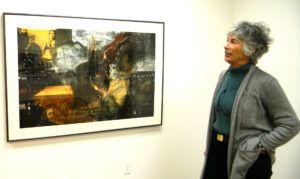
By Michael Howell
An exhibit of works by local photographer and digital artist Barbara Michelman is on display through the month of January at The Frame Shop on Main Street in downtown Hamilton. The project on display, entitled “Past is Prologue,” is a series of photo montages that not only illustrate her family roots in Lithuania, but gives voice to and puts a face on the suffering and loss endured, not only by her family but by whole populations, as Hitler’s ‘final solution’ was imposed across eastern Europe.
“This show is really a step into not just my family story, but into the heritage of a whole country,” said Michelman. “It is a painful look at man’s cruelty to man. Until we are willing to look into that for what it is, we are destined to keep doing it.”
Michelman’s work is a mixture of words and images. Photo montages replete with words, portions of old letters, names of people and towns, and other pertinent documents and phrases are accompanied by written text that is replete with images of the unspeakable.
Her father was born in the village of Paneriai. She visited the place in 2003-2004 as she toured Lithuania. Michelman said that her father never talked about the place of his birth. After visiting the village and the killing fields located nearby, she has a better sense now of what lurked at the root of that silence.
“He must have known what happened here then—seventy thousand Jews, and another twenty to thirty thousand others, killed on this site, the village of his birth. His uncle, who could not get a visa with his family to leave for America, was shot here by the Germans, in their loathing for something I still do not understand.
“It is here in the killing fields that I lost him. It is here that the rabbinical boy who denied God, who turned towards the world seeking salvation in Marx and Lenin, lost his faith in the possibility of human decency. I wept today at Paneriai, for the silence that became his life, for the spirit that was broken in these bloody fields,” wrote Michelman in the log she kept while traveling.
Mixing words and images is second nature to Michelman now. Her education started out with a heavy emphasis on words. She earned her BA in Philosophy from the University of California at Berkeley in 1964 and went on to study both sociology and psychology. When, years later, her marriage ended in divorce, she moved to Los Angeles and ended up getting a job at Paramount Pictures as a lighting technician. The union in Hollywood had just opened to women and she was the first woman hired.
“I learned lighting from the best in the world at the time,” said Michelman.
When she moved back to the San Francisco Bay Area, however, the union there was still not accepting women. Not willing to take on that fight, she turned to photography as an alternative way of making a living and worked for Close-up Expeditions, a company that specialized in travel tours emphasizing photography. But Michelman never leaves anything behind and ended up integrating all that training in philosophy and film lighting and the traveling bug into her photographic work. The result is profoundly moving.
Michelman says that the photography exhibit on display is not just about the past.
“It’s about who we are and where we are headed. It is not just about an historical event, but what it means for us going forward. It’s about the need to take a look at things we don’t want to talk about as a nation. That’s the reason for the title: Past is Prologue,” she said.
“It may seem a long stretch from life here in the United States to the story of one family born in Lithuania, who lived there over a century ago, who came to this country under duress, and whose story there ended in the fields of Paneriai. Yet generations later that landscape still echoes from the consequences of a war and of a people whose actions were driven by a national idea of themselves. It is my hope that this exhibition raises questions about ideas, beliefs and the power of ideology as cosmology,” she writes in the introduction to the book which she has published containing reproductions of her photo montages and texts.
“In the arc of our lives, past is prologue, and it is left to each generation, as Hannah Arendt once said, to stand ‘committed witness’ to what is before us,” writes Michelman.
